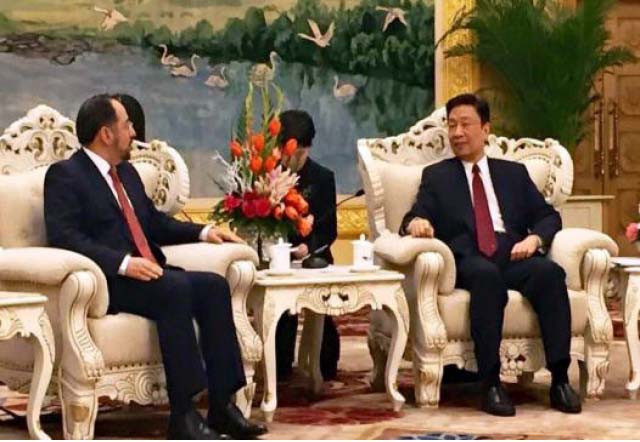As the four-way initiative is preparing the ground for peace talks between the Afghan government and the Taliban, China’s role in the process is emerging as a key opportunity for the talks to succeed and end the long-lasting conflict in the country. Afghan Foreign Minister Salahuddin Rabbani recently paid a visit to Chinese capital Beijing to discuss the peace efforts as well as security and cultural issues with the Chinese officials. Rabbani’s visit to China came after the second meeting of the Quadrilateral Coordination Group – comprising Afghanistan, Pakistan, US and China – was held in Kabul last week. The four-nation coordination group is set to finalize a framework and draw a roadmap for the peace talks between the Afghan government and the Taliban groups. At conclusion of its last meeting in Kabul, the group called on the Taliban to enter peace negotiations with the government of Afghanistan.
In the recent years, the Chinese government have signaled a more active engagement for resolving the conflict in Afghanistan. Afghan governments have long been trying to engage Beijing in efforts for resolving the conflict in Afghanistan. Former president Hamid Karzai initiated the efforts to get China involved in matters of the war and peace efforts in Afghanistan. However, with the presence of the US-led coalition fighting the Taliban, China largely avoided to get drawn into the conflict which Beijing was not viewing it as it as relevant to its interests. With the gradual exit of the Western coalition ahead of 2014, China signaled greater presence in Afghanistan’s development efforts and more active role in the regional diplomacy for resolving the conflict in the country. A flurry of high-profile diplomatic trips of Chinese diplomats to Kabul and Islamabad was the first signs of a shifting approach in Beijing over the country’s engagement in Afghanistan. The country has made it clear now that it is going to play a completely different and more active role in persuading the Taliban to reach a peace deal with the Afghan government.
The visit of the Afghan foreign minister to Beijing was an opportunity for both countries to work together more closely to establish a plan for the peace talks and bring the Taliban to the table of negotiations. Afghanistan and China has much to do as part of the four nations working jointly on the resumption of the Afghan peace efforts. China’s role is crucial in both the initial preparation phase of the ongoing initiative and the real process of negotiations between the Afghan government and the Taliban. The ongoing preparations led by the four countries would play a key role in success or failure of the overall peace process. Most of the past peace efforts failed at the very beginning and mostly even before the inception of the talks.
China is believed to have considerable influence over Pakistan, who in turn is believed to have unchallenged influence and control over the Taliban militant group. Given that Afghanistan highly values China’s role in the Afghan peace process, Beijing can play an exceptional role in persuading Islamabad and Kabul to continue to work on peace-related issues and even the trickiest challenges which have failed both sides in the past. Afghanistan and China need to work with the Pakistani government to ensure that the efforts would remain on track at events of any unexpected circumstances. As China is going to play an active role in the assumed peace process aimed at ending the long-lasting conflict, the government of Afghanistan needs to do more to further expand relations with Beijing as it is pursuing more improved relations with Islamabad. Improving ties between Afghanistan and China is as much important for the prospect of peace process as improvement of relations between Afghanistan and Pakistan.
The parties involved in leading the preparations for resumption of peace talks have come a long way forward as they now pursue the efforts through the established four-way governing platform. The four-way efforts is going to institutionalize the joint cooperation among the four involved countries and would result to development of an efficient and well-functional body governing the whole peace process. The coordination group provides China and the US to join their cooperation for resolving the Afghan conflict in a coordinated and organized way, which was not possible without such a joint working group.
The four-way initiative preparing the framework for the peace talks could viably work as the governing body for leading the peace negotiations in the future. Therefore, it is crucially important for the involved countries to develop and further boost the initiative as a robust and comprehensive governing body overseeing the future peace talks into success. While the previous trilateral efforts of the US, Afghanistan and Pakistan did not prove effective for making consensus over the war and peace efforts in Afghanistan, there are many reasons that the four-way initiative – that includes China – would work in successfully leading the peace efforts. China is emerging is a savior of the struggling US efforts in Afghanistan while Beijing has also good relations with Pakistan and Afghanistan. Ironically, the Taliban also have positive views to China due to the Chinese policy of non-interference.
China’s engagement is one of the rare opportunities for the long-waited peace negotiations between the Afghan government and the Taliban. All parties, including the Taliban, need to realize the opportunity and remain aligned with the overall efforts to lead them to success.
The Afghan government hopes the Chinese involvement in the process would be a milestone for the peace efforts. However, the Chinese engagement will also be a crucial test for success of possible future peace negotiations aimed at ending the long-lasting conflict in the country.
Home » Opinion » China’s Engagement in Afghanistan’s Peace Efforts
China’s Engagement in Afghanistan’s Peace Efforts
| Abdul Ahad Bahrami

